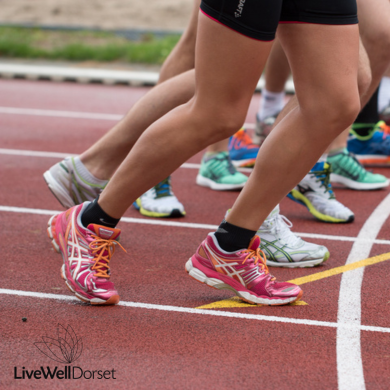
 Livewell Dorset Home page link
Livewell Dorset Home page link
0800 840 1628 • Monday - Friday 9am - 6:30pm Contact Us
For many of us, moving more isn’t always simple.
Pain, fatigue, injury, or anxiety can make even the smallest steps feel impossible. But my journey navigating Chronic Fatigue Syndrome taught me something truly important: movement doesn’t have to mean miles or marathons, but mindful steps that help rebuild strength.

When I was young, sport and exercise had always been my thing. I loved every aspect of training and competing, pushing limits and being part of a team. It brought me so much joy and energy and gave me a real sense of purpose. Then, almost overnight, everything changed.
I went from being constantly active to barely able to get out of bed. Being diagnosed with Chronic Fatigue Syndrome (CFS), meant my whole life had to slow down. Training stopped. Socialising stopped. Even everyday tasks felt out of reach.
At first, it wasn’t about exercise at all. It was about listening to my body, fuelling it with rest, good food and kindness. Finding this balance took a while but once my body felt stable, I was able to look at getting moving again.
My first ‘win’ might not sound like much: I simply drove to the shops, walked round, picked up a few items and came home again. When your body is in survival mode, those small steps are huge achievements. My first “win” will look very different to yours, but every single one is worthy of a cheer. Every movement counts and the best way to make it stick is by starting small. Have a look at habit stacking for some movemement ideas.
When we live with pain, fatigue, or health challenges, the idea of exercise can feel impossible. Research shows that even gentle, regular movement can:
Improve energy levels by helping your cells use oxygen more efficiently.
Reduce stiffness and pain by keeping joints and muscles active.
Lower stress and anxiety by calming the nervous system.
Boost mood by releasing “feel-good” chemicals like endorphins.
.jpg)
We all face barriers to moving more. For some, it’s pain. For others, it’s anxiety, fear of setbacks, or feeling self-conscious. Over the years, I’ve experienced them all.
Here’s what helped me:
Mindset: reminding myself that no journey is linear. Progress is never wasted.
Pacing: starting small and building slowly. If I could walk to the post box one day, the next time I might go two steps further.
Support: talking to a friend, or moving with someone I trusted, helped me keep going.
Flexibility: swapping a walk for gentle stretches on painful days.
The key is not to push through, but to listen. Mindful movement means checking in with your body:
How am I feeling today?
What’s my pain level?
Do I need to save energy for something tomorrow
Now I’ll admit, I can be quite competitive. And with that, I wanted goals and targets I could reach for. Although this has proven to be beneficial for some, life with health challenges can be unpredictable, meaning rigid timeframes and targets can be crushing when your body doesn’t keep up. Instead, I learnt that what matters most is simply noticing how my body feels and moving in whatever way feels right for me.
Over the years, those tiny steps added up. I went from being bedbound, to walking to the shops, to studying again, to hiking the Dorset coastline. Today, I live independently: I walk my dog daily; head for cold dips in the sea; socialise with my friends, all while keeping up with work! This didn’t happen overnight, and I’ve seen my fair share of ups and downs. But look at where we started! That’s the power of mindful movement.

If you’re reading this and movement feels out of reach, remember: you don’t have to do it all at once. You don’t need miles, minutes, or medals. You just need movement.
Start small. Stretch your arms. Walk to the gate. March on the spot during TV adverts.
Listen to your body. Rest when you need to.
Celebrate the little wins. They are never “too small” to count.
Every step you take is a step towards more energy, more strength and more confidence in your body.
We're here for your health and wellbeing. Want to make a change? Register or contact us today to take your next step to LiveWell.
Your search has returned 105 more results
View all results